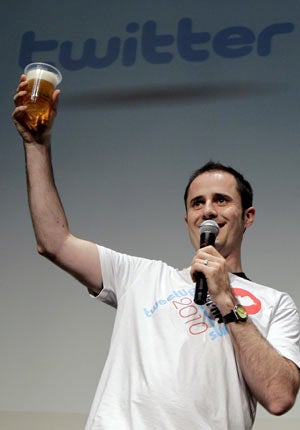Adam Sherwin: How long can Twitter remain above the law?
A series of legal actions will mean that the millions of users of sites like Twitter and Facebook can no longer post their comments without impunity

The net is closing in on social media sites which claim they are under no obligation to unmask users who publish material that breaches the law. Twitter has said it will not censor or identify a mystery user who claimed to expose celebrities using super-injunctions, despite the material being potentially considered to be in contempt of court.
The San Francisco-based social networking site, which recorded the busiest day of online traffic in its history yesterday, lies outside of the jurisdiction of UK courts. Relying on the US First Amendment commitment to freedom of speech, Twitter advises individuals complaining about abusive or libellous tweets: "If you're dealing with a potential legal issue, please contact a lawyer".
But Government action and a series of legal actions will mean the millions of users of sites like Twitter, Facebook and Wikipedia can no longer post comments with impunity. Privacy lawyers acting for celebrities who have taken out super-injunctions could expose the Twitter leaker by forcing internet service providers (ISPs) to reveal the individual's details. Sarah Webb, a privacy lawyer at Payne Hicks Beach, said: "Twitter lies outside the UK courts' jurisdiction, but a Norwich Pharmacal order [which requires a respondent to reveal information to the applicant] could be obtained which requires ISPs to disclose the email account details of the user."
Ms Webb said she had already used the order to identify malicious anonymous posters on web bulletin boards. But such an order might not reveal the identity of the tweeter, if they had used an internet café, for example.
Twitter is also facing a threat from the US government, which is continuing a probe into the source of the WikiLeaks cables. A Virginia court has ordered the site to hand over the personal account information of users it suspects have been in contact with the WikiLeaks head, Julian Assange.
A judge ruled that Twitter had made their user details "public" once it had published their posts.
The US government is now considering using the 1917 Espionage Act to prosecute WikiLeaks. That makes it a crime to "communicate or transmit" sensitive information to an unauthorised party, setting the scene for a court showdown over freedom of speech.
Wikipedia is also discovering the limits of internet freedom of speech. This week Louis Bacon, a billionaire US hedge fund manager, was given permission by the High Court in London to force three sites, including the online encyclopaedia, to disclose the identities of online commentators alleged to have defamed him.
Mr Bacon plans to sue the individuals, but it is unclear to what extent the US-based companies affected will be compelled to abide by the UK court order. The British government's move to create a "watchdog" to regulate social media networks could fall foul of EU law, if the proposed body is given any punitive powers.
Twitter argues that it is not a "publisher" subject to libel laws, but merely a software tool to facilitate communications. The E-Commerce Directive protects networks such as Twitter from liability for material that it does not "create" or "monitor", but simply stores or passes on to users of their service.
"It's quite clear that this person was aware of the terms of a court order prohibiting the naming of these people," said Ms Webb. Any individual who publishes or retweets material suppressed by a court injunction could be prosecuted for contempt of court and face a heavy fine or jail sentence, if intent is proved. If an attempt was made to pursue Twitter through the courts, it would have to demonstrate it took steps to prevent the transmission of illegal information once it became aware of it.
The super-injunction tweeters could face action from celebrities who may have wasted up to £250,000 securing a gagging order. A musician in Liverpool, whose Twitter account was "followed" by the injunction tweeter and who retweeted those tweets on Sunday, denied that he was the source of the account. The media lawyer Mark Stephens said: "They [the tweeters] are clearly in contempt of court. These celebrities will not take this lying down."
Join our commenting forum
Join thought-provoking conversations, follow other Independent readers and see their replies
Comments
Bookmark popover
Removed from bookmarks